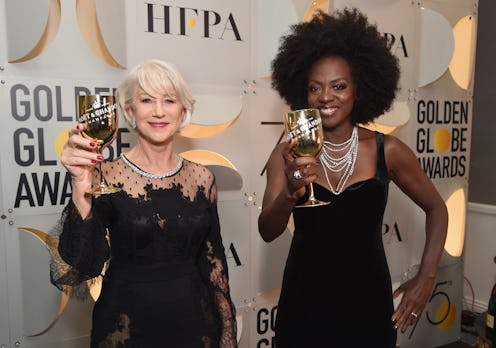Fashion
Telling Women They Should Have Boycotted The 2018 Golden Globes Is Actually Just Telling Them To STFU

"Wouldn’t it have been more meaningful to boycott the Golden Globes rather than just…wearing black?" reads one tweet on my timeline. "I think the idea of all these women wearing black to the golden globes is just.... ugh like I hate half ass stances. If you really want to protest or boycott be about it," reads another. "Wearing black a subpar gesture," another tweet argues, "You wanna make a statement you boycott."
I've read this sentiment over and over again, both before and during the 2018 Golden Globes: The argument that if you really want to push back against something, you have to completely remove yourself from it, withdraw from the entire experience, stay home instead of showing up. Each time I see someone expressing that sentiment, I ask myself the same question: Why?
It's true that the basic premise of extremely wealthy people dressing in black designer gowns en masse is relatively meaningless. Viewing what happened on the 2018 Golden Globes red carpet as nothing but a series of wardrobe choices is, at best, reductive. At worst, it's a befuddling contradiction: Why should women — actors or otherwise — have to stay home and silence themselves in order to be heard?
This isn't the first time I've seen a similar line of argument. When former San Francisco 49'ers quarterback Colin Kaepernick took a knee during the national anthem — a show of solidarity with the Black Lives Matter movement — he inspired a wave of professional athletes to do the same. Many fans were offended by the gesture, arguing that in Kaepernick truly wanted to make a statement, he would leave the NFL altogether. Instead of acknowledging his action as a form of peaceful protest, they wanted Kaepernick to shut the hell up and stay home.
It seems that want the same from Hollywood, too. To be fair, I can clearly see why something as trite as choosing a black gown that costs more than most people's rent checks could be misinterpreted a half-assed, superficial attempt at activism. As New York Times writer Jenna Wortham wrote in January 2018, there's not much at stake for privileged people when they decide to take a stand.
"There is something unsettling about how little these celebrities have to lose by taking these stances," Wortham wrote. "They aren’t risking financial ruin, nor are they vulnerable to violence, as is the norm for most who take a bold position. It feels completely privileged, and a little complicit, to still participate in the larger system that has condoned sexual violence in their industry. Besides, don’t they already wear lots of black on the red carpet anyway?!"
Pre-Golden Globes, Wortham concluded that despite her previous points, it was possible that a red carpet protest could, in fact, make an impact — and in my opinion, that's exactly what happened. If you manage to bushwhack your way through all those layers of black tulle and glittering privilege, you find something that's actually quite powerful: A group of people, now more diverse than ever, with a massive platform and the ability to use their resources to mobilize those who can't do it for themselves.
On the 2018 Golden Globes red carpet, celebrities seemed to recognize the responsibility of their position. Stars like Emma Watson, Debra Messing, Viola Davis, Alison Brie, Eva Longoria, Reese Witherspoon, and Meryl Streep kept their red carpet conversations as focused on the movement as possible. Some actors even brought full-time activists as their dates for the evening, bringing much-deserved attention to the influential people who have dedicated their lives to the cause without any of the fanfare. All of these choices go beyond the evening, too: The red carpet blackout is part of a larger campaign called Time's Up, an initiative that has raised more than $15 million for a legal defense fund for people who experience workplace harassment. Yes, a black dress is just a black dress — but an effort of this magnitude, with this many amplified voices, could actually make an impact.
For me, there's little coincidence in the fact that both Kaepernick and the women of Hollywood have been subject to the confusing argument that if they really want something, they should never ask for it. Women and people of color face that exact paradox all the time; modern systemic racism and sexism relies on silence washed with a veneer of acceptance.
Despite this newfound wave of outspoken, high profile voices, Hollywood is not without its own specific set of problematic contradictions. Some of the celebrities — even the ones in black — at the Golden Globes were likely indirectly complicit in the silence that empowered Harvey Weinstein to operate as he did for decades. Some of them may even be guilty of similar behavior themselves. It can't be ignored, but it's also important to recognize that major cultural shifts rarely show up in the public consciousness without such ugliness in tow. Despite its strengths, weaknesses, and both incredibly hopeful and inevitably problematic outcomes, a movement like Time's Up — and the decision by Hollywood's elite to wear all black to the Golden Globes — isn't one that benefits from silence. Instead, we should demand that everyone get louder.